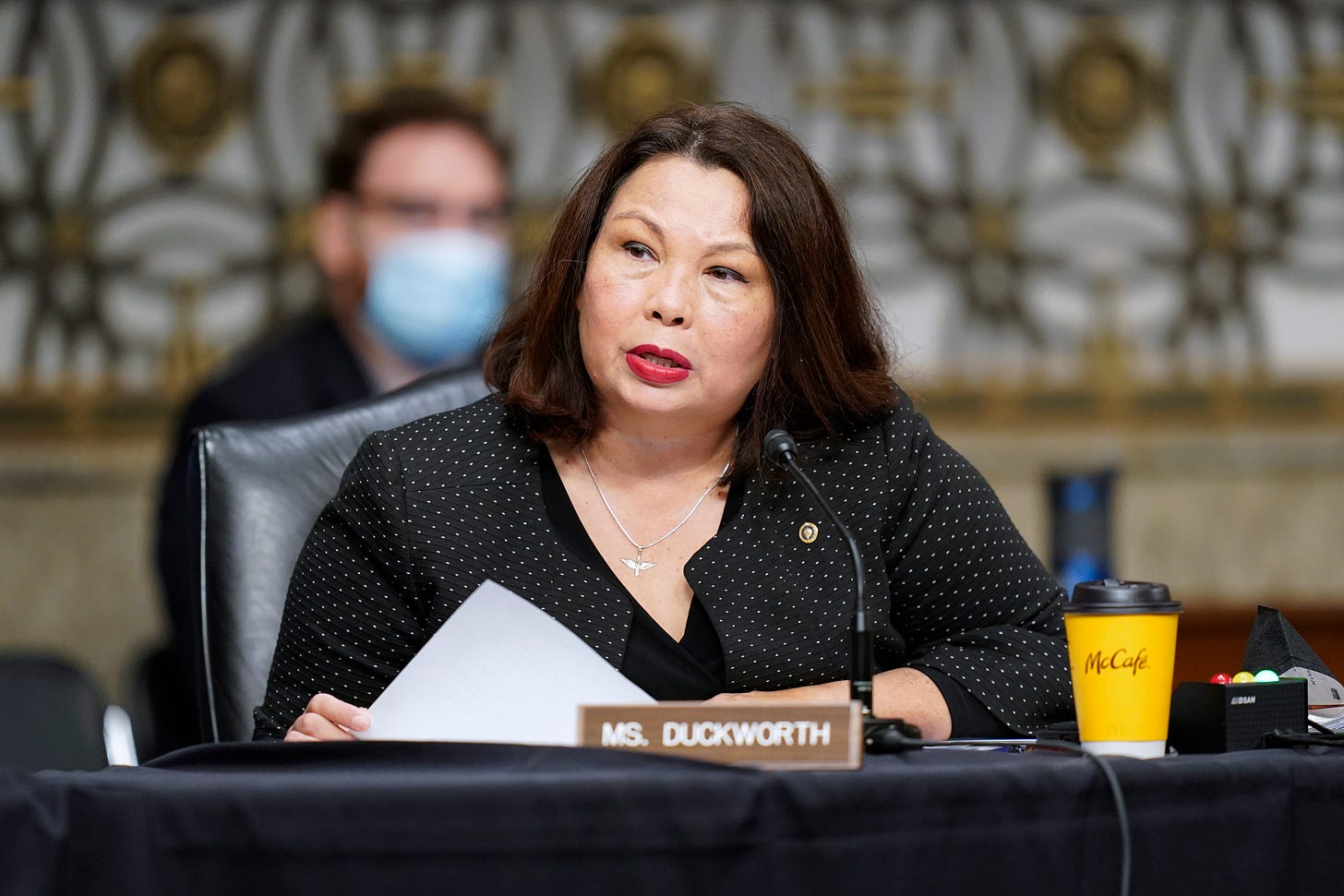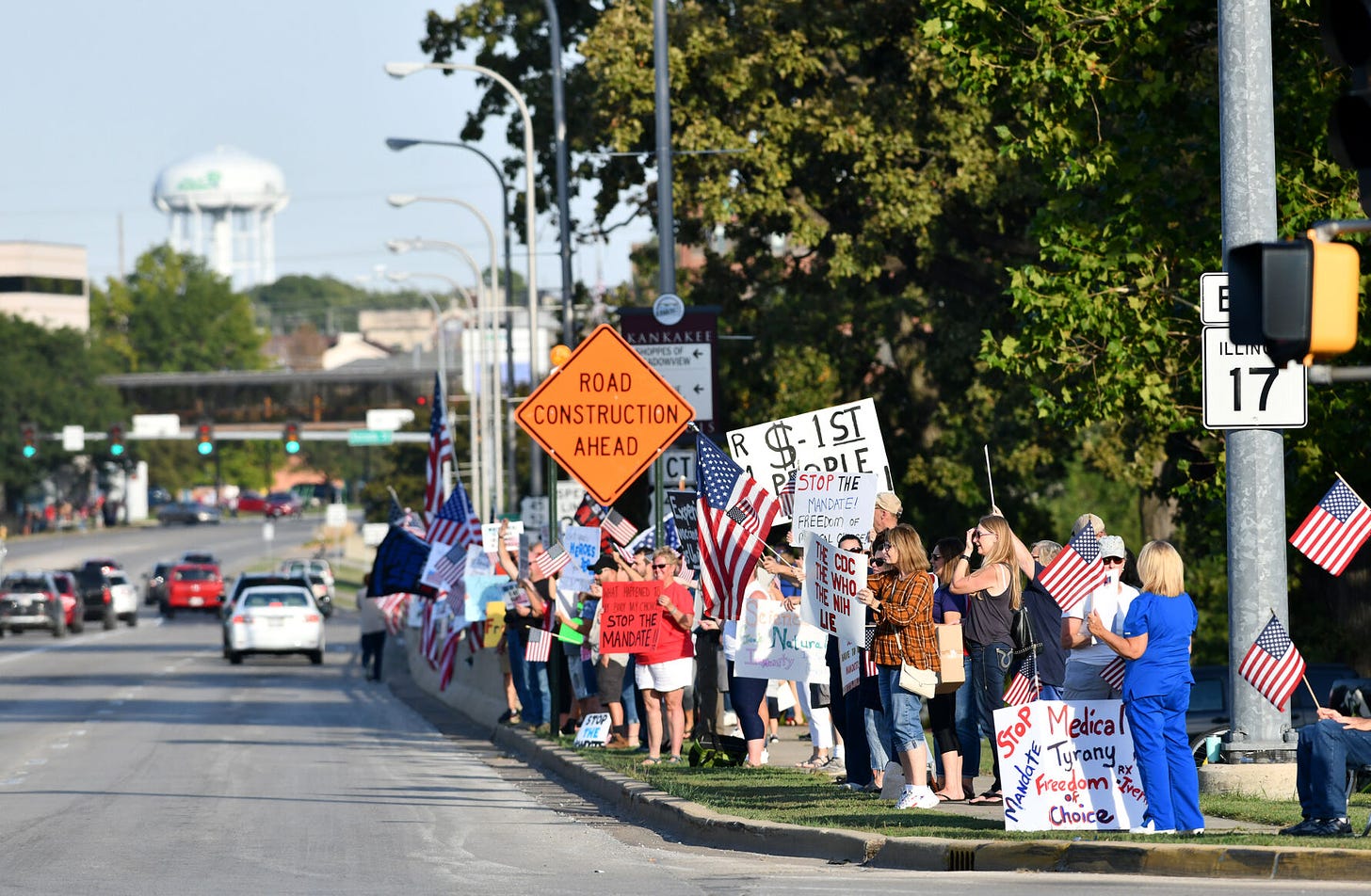THE ILLINOIZE: Monday Free for All
October 4, 2021
Good morning and happy Monday.
The House announced hearings for the soon-to-be unveiled Congressional (and judicial subcircuit) maps, which we expect to see around the time veto session begins in two weeks.
The House hearings appear to be a combination of in person and virtual. During the hearings earlier this summer on the second round of legislative maps, almost none of the House Democrat members attended any of the hearings in person.
I asked Speaker Welch’s spokesperson last week how many plans were submitted in the state’s online portal in either May or August and if she could point to any district that a map submitted online was taken into consideration.
We haven’t heard back, but I’ll let you know if we do.
We’re offering a free month of our subscriber-only content for you to give us a try before you take the leap for a full year subscription.
You’ll just sign up for your free month here, put in your information, and you can either get your year subscription (charged at $75 for the year) or you can let it expire after 30 days. We want you to get a chance to see what subscribers are receiving and make the decision whether or not you want to become a paid subscriber.
As always, drop me a note with your questions, comments, or concerns at patrick@theillinoize.com.
Let’s get to it.
YOUR MONDAY FREE FOR ALL
(note: we’re not responsible for paywalls and restrictions from other news outlets)
You pay more in property taxes because 27,288 Cook County homeowners pay nothing (Chicago Sun-Times)
No one likes to pay property taxes. This year, the owners of 27,288 homes across Cook County don’t have to.
Their property tax bills: $0.
That they’re paying nothing means the rest of the county’s 1.8 million property taxpayers — the remaining homeowners and business owners — have to pick up the slack, a total of just under $102.8 million.
The pay-nothing bills result from a host of property tax exemptions the Illinois General Assembly has given homeowners over the years. The biggest tax breaks go to homeowners 65 and older and disabled veterans.
Among the homeowners whose property taxes are entirely wiped off the books because they are disabled veterans are U.S. Sen. Tammy Duckworth, former Ald. James Balcer and some veterans who are now Chicago police officers, a Chicago Sun-Times analysis has found.
Duckworth — the state’s highest-profile combat veteran — hasn’t had to pay any property taxes since 2015 on the home she and her husband own in Hoffman Estates.
Over the past six years, her tax breaks have totaled $42,479 — $4,637 from the homeowner exemption that nearly every homeowner receives and $37,842 under a tax break Illinois legislators passed in 2015 for veterans who have been certified by the U.S. Department of Veterans Affairs as being at least 70% disabled.
I’m leading with this story because of how much it infuriates me. Not the tax break. It’s not giving a property tax bill of $0 to every veteran, it’s giving a property tax break to those who are at least 70% disabled.
The Sun-Times did a terrible disservice by trying to make Duckworth the example in this situation. I have mountains of policy issues with Duckworth and don’t think she’s a particularly bright mind when it comes to public policy. But my political differences with her are separate from the fact her legs were literally blown off in a combat mission serving our country in Iraq in 2004.
Duckworth is lucky. She’s been elected to a job in a relatively low-impact position with a good salary and the property tax break probably isn’t needed. But when you think about veterans’ all around the state who were injured in Vietnam or the Gulf War, or the War on Terror, many of them aren’t so lucky. They depend on disability checks to survive. Maybe their spouse can’t work to be a 24/7 caregiver. Lord knows the mortar and IED blasts in Iraq and Afghanistan have left far more with traumatic brain injuries than we ever could have imagined.
So, back off on this property tax exemption. It benefits far more than those who take advantage of the break. In the case of Illinois’ gigantic property tax problem, this break is a drop in the bucket.
Employees, supporters protest vaccine mandates (Kankakee Daily Journal)
Tina Irvin, a 37-year Kankakee area registered nurse from Momence, said she is afraid to look inside her mailbox for fear there will be a notice rejecting her exemption request for not taking the COVID-19 vaccination as required by her employer.
Late Wednesday afternoon, she stood with other protesters — mostly healthcare workers — demonstrating their solidarity against what they believe is an improper mandate to become vaccinated against the pandemic-causing COVID-19 virus.
“I know they think we don’t know how to think for ourselves, but we do,” she said. “I’m not getting this. I’m afraid to look at my email.”
Whether she will receive her exemption or not, the next month will be likely tension-filled for numerous employees at Riverside Healthcare and AMITA Health St. Mary’s Hospitals as their deadlines for employees to get vaccinated inch near.
At Riverside, employees have until Oct. 31 to receive their vaccination. If they are not vaccinated by then, those employees deemed not to be exempt from the mandate will be suspended for two weeks and then terminated if still not in compliance.
At AMITA, the deadline is Nov. 12 and the resulting procedure is the same.
In a requested response to Wednesday’s protest, Riverside’s marketing director Carl Maronich said, “As an organization with deep roots in the community, we acknowledge that some of our friends and neighbors have strong feelings regarding vaccine mandates. We respect those community members and their right to express their views publicly.
“While we strive to avoid issues that generate controversy, we must state clearly that the COVID-19 vaccine offers our patients, employees and community the best protection from serious or even fatal complications that could result from the virus.”
Among those with strong feelings is Neelie Panozzo, a nurse practitioner and a leader in the local movement seeking freedom to decline the vaccination. She said she was not surprised by the large turnout of Wednesday’s protest.
“We are going to lose our jobs. We are being forced out because of our views,” she said. “They are pushing very competent healthcare workers out of Kankakee County.
Related: Unvaccinated city [of Chicago] workers will face COVID testing (Crain’s Chicago Business)
Medical “freedom” group protests in downtown Mattoon (Decatur Herald & Review)
'Stay vigilant': COVID cases on the decline, but positivity rates remain high in southern Illinois (The Southern Illinoisan)
Suburban District 300 school board, employees face threats, board president says (Daily Herald)
Political shrugs replace scramble for funding as Bears eye move to suburbs. ‘Cities are smarter now.’ (Chicago Tribune)
A lot has changed in the decades since Chicago last confronted the issue of a new playground for the Bears, before the team settled into a vastly remodeled and reconfigured Soldier Field in 2003 after years of negotiations involving the city and the state.
There is the booming success of the National Football League and the value of its franchises, the growing importance of year-round climate-controlled stadiums as a revenue asset for teams and far greater public opposition toward subsidizing multibillion-dollar sports facilities for wealthy owners.
But one thing has stayed the same over the years.
“It’s not so much the size of the market. It’s the stadium deal,” Ted Phillips, now the Bears’ president and CEO, said in 1996 when he was the team’s point man in negotiating for a stadium. “Stadium revenues are what NFL teams are shooting for.”
The taxpayer-funded debt payments would continue, even if the team breaks its Soldier Field lease early, which runs until 2033. If the Bears were to break that agreement in five years, they’d face an estimated $84 million penalty, a Tribune analysis found. The longer the Bears take to move out, the smaller the penalty would become.
Former Republican Gov. Jim Edgar said he couldn’t imagine the Bears receiving public financing for a new stadium, “because we’re still paying on the bonds for Soldier Field.”
In the mid-1990s, Edgar favored what became known as “McDome,” a domed-stadium expansion to McCormick Place that the Bears vetoed in favor of then-Mayor Richard M. Daley’s Soldier Field renovation plan. That decision was made in part because of the team’s desire to maintain an open-air stadium for the “Bear Weather” factor. There’s no talk of cold-weather mythology this time around.
“What’s still fresh in most people’s minds is we just paid for a stadium and that, I think, makes it extremely difficult to sell (taxpayer financing) to the public,” Edgar said. “These things were always hard to sell to the public.”
Related: At Chicago Bears’ tailgates Sunday outside Soldier Field, the team’s possible departure is a burning issue: ‘Arlington Heights, if they move, here I come’ (Chicago Tribune)
Opinion: Can Chicago avoid another sack? (Crain’s Chicago Business)
Mike Royko on the Bears, Arlington Heights — and Richard J. Daley: A copyright on ‘Chicago’? (Chicago Sun-Times)
“If the Bears move to the suburbs, it will be a depressing symbol of the great flight of families and businesses from the city, further evidence that under Daley’s rule a lot of people have decided Chicago really isn’t a very wunnerful place to live, work or throw a screen pass.”
Royko was the best.
Majority of those surveyed by UIS have considered moving out of Sangamon County (State Journal-Register)
University of Illinois Springfield published its biennial citizen survey on Tuesday. Similar to its 2019 findings, there was an even split among the 726 survey respondents on whether Sangamon County is headed in the right direction.
Questions ranged from confidence meters on quality life to if they trust local police. A majority — 58% — have considered moving out of Sangamon County since summer 2020. That's a similar number to the 2019 survey but is more than 20 percentage points higher than survey respondents polled in 2015 and 2017.
“It’s disappointing to see so many respondents to the survey considering moving out of the area and I hope it speaks to elected officials and those in leadership to make every effort to improve the quality of living for our residents,” said John Kelker, president of the United Way of Central Illinois, which helped fund the survey.
A majority of survey respondents who expressed a desire to move cited both local and state tax rates and politics as reasons encouraging them to want to move away from Sangamon County.
Responding to questions on businesses, 87% of survey respondents said they were concerned about the economic ramifications of the COVID-19 pandemic and how it will affect local businesses. Seventy-three percent said they were more likely to support local businesses than they were prior to the start of the ongoing pandemic.
It has to be tough to live in Springfield right now. Local schools aren’t great (unless you live in Chatham or Rochester), downtown is a shell of its former self, and state government has continued its centralization in Chicago.
Some of our top links from the past week:
Judge Rules ISBE Can't Penalize Schools over Mask Order…For Now
Potential Burke vs. O'Brien Supreme Court Race Could be Most Expensive in State History
Southern Illinois in Line for Potential House Primary Slugfest
JOIN US












